Mannheim Master in Data Science
General questions
Why is it important to read the examination regulations?
The examination regulations state your rights and obligations as a student enrolled in the Mannheim Master in Data Science at the University of Mannheim.
Can I change any modules?
Please note that only students enrolled before spring 2020 can change modules.
Requests to the examination committee must be submitted in writing. Please make sure to indicate your address, student ID number and e-mail address in case we need to contact you for follow-up questions. We also ask you to state the semester in which you started your master's program so that we know straight away which examination regulations apply to you.
Changing a module you have not passed yet
If you have chosen the wrong module, you have the possibility to request a module change. The request must be submitted to the responsible examination committee in writing using the following form:
Please bear in mind that any unsuccessful examination attempts will be transferred from the original module to the new module!
Please also note that a module change does not affect the requirements defined in your examination regulations. In particular, the provisions on the credits required in the different subjects remain valid.
You will remain registered for the original module until the end of the exam registration period. In case you are still registered for the original module after the exam registration period has ended, please contact Student Services I.
Why am I still registered for the original exam after a module change?
In case you are still registered for the original module after the exam registration period has ended, please contact Student Services I.
How am I assigned a team project?
At the beginning of each semester, the Institute of Computer Science and Business Informatics organizes a presentation session where all chairs offering team projects introduce their topics. After this session, you can register for a team project in Portal², indicating your preferences.
Do I need to finish all of my exams before starting my master's thesis?
Although some chairs might verify whether you have completed all your examinations, you are formally only required to accumulate at least 60 ECTS credits before starting your thesis. Nevertheless, we strongly advise you to finish all your examinations first. Writing a master's thesis is a full-time job, and it takes a lot of coordination and organization to take exams and write a thesis in parallel.
How am I assigned an individual project?
Individual projects are offered by the chairs. In general, you should approach one of the lecturers offering courses in the MMDS program and agree on the topic and scope of your project individually.
Can I study abroad for a semester?
Yes, that is possible. To do so, you can refer to the list of partner universities of the School of Business Informatics and Mathematics (see list here) and the list of partner universities of the University of Mannheim.
Since data science is a relatively novel field, most of our partner universities mainly offer master’s programs in the fields of business informatics and mathematics, and do not have special data science programs. You therefore have to verify yourself whether the course catalogs contain a sufficient number of courses related to data science. Depending on whether you select courses with a focus on computer science or mathematics, you need to apply either for an exchange within the Business Informatics program or in Mathematics in Business and Economics.
Details on how to transfer credits you obtained at your host university abroad can be found here.
More helpful information is provided on the web page of the International Office of the University of Mannheim.
In case of questions, please contact Juliane Roth.
Degree plans and course schedules
The Mannheim Master in Data Science (MMDS) program equips students with the knowledge and skills necessary to gain operational insight into large and complex datasets. It covers six major areas: Fundamentals, Data Management, Data Analytics, Responsible Data Science, Projects and Seminars, and the Master’s Thesis.
Fundamentals (0 – 14 ECTS)
The goal of the Fundamentals area is to align the different knowledge students acquired in their previous degree programs. Graduates of computer science and mathematics programs will acquire the knowledge required in empirical research (in particular, data collection and multivariate statistics). Graduates of social sciences programs and other fields will acquire the knowledge required in computer science (in particular, programming and database technology).
Data Management (18 – 36 ECTS)
One of the central challenges in the Big Data area is to handle the enormous amount, speed, heterogeneity, and quality of the data collected in industry, the public sector, and science. The Data Management area covers methods and concepts for obtaining, storing, integrating, managing, querying, and processing large amounts of data. The area includes courses on modern data management technology (such as parallel database systems, Spark, and NoSQL databases), data integration, information retrieval and search, software engineering, and algorithms.
Data Analytics (30 – 54 ECTS)
The Data Analytics area forms the core of the study program. It provides courses ranging from data mining, machine learning, and decision support, over text analytics and natural language processing, to advanced social science methods such as cross-sectional and longitudinal data analysis. The range of methodological courses is enhanced by courses on optimization, visualization, mathematics and information, and algebraic statistics.
Responsible Data Science (3 – 10 ECTS)There are great concerns about the use of data. A variety of stakeholders are increasingly becoming concerned about the irresponsible use of data. Within this field, students study data science techniques, infrastructures and approaches in order to make them more responsible.
Projects and Seminars (14 – 18 ECTS)
The Projects and Seminars area introduces students to independent research and teaches the skills necessary to successfully participate in and contribute to larger data science projects. The area consists of research seminars, individual projects, team projects. The projects are conducted jointly with industrial partners and/
or support ongoing research efforts of participating institutes. Master’s Thesis (30 ECTS)
In the master’s thesis, students apply what they learned throughout the program. The master’s thesis is written over a period of six months. Students are encouraged to write their thesis either in the context of research projects conducted by participating institutes or in cooperation with an industrial partner. Students often write their master’s thesis in cooperation with a company from the MMDS Industry Partner Network.
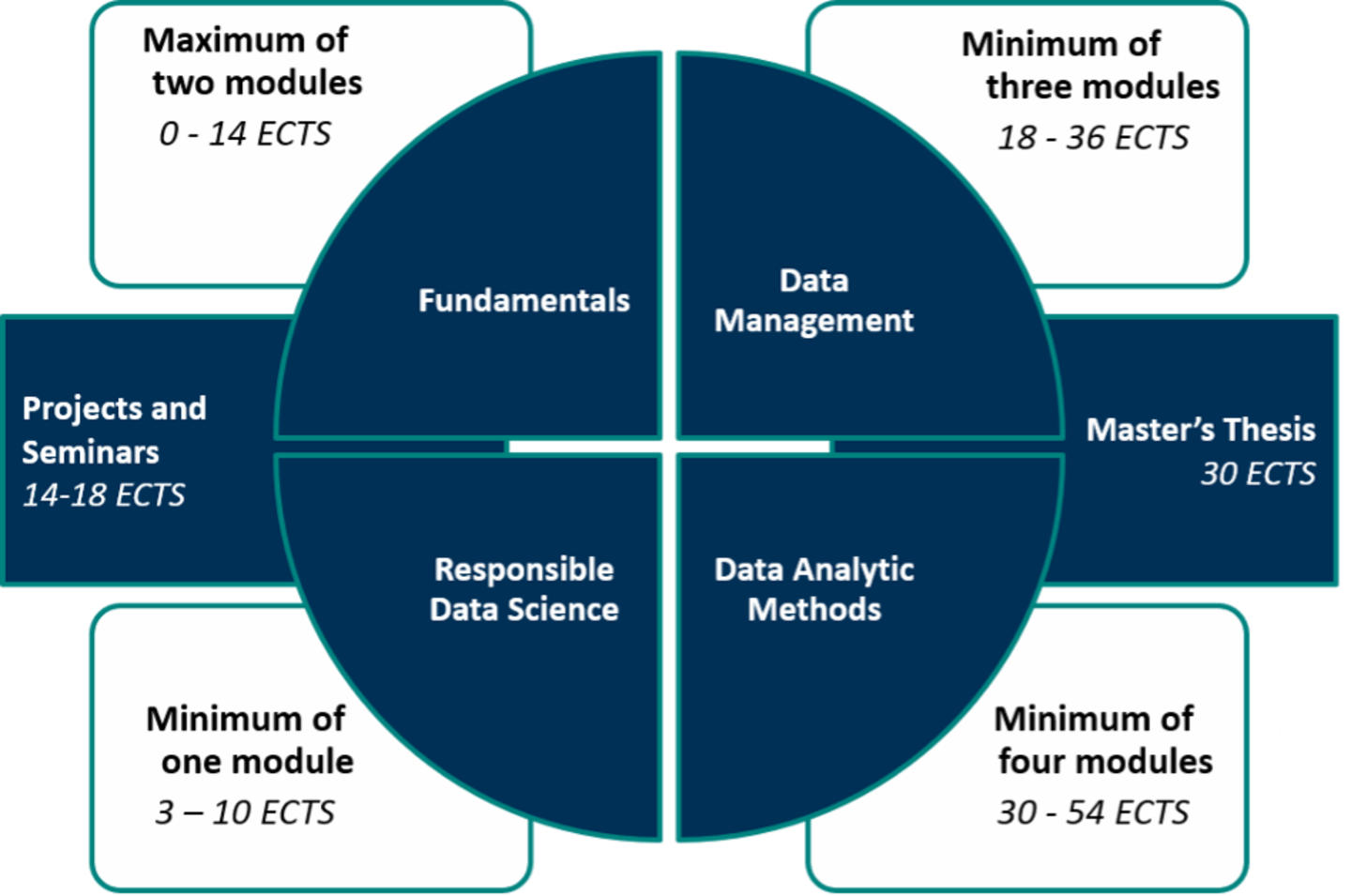
Course schedule
For students that started their masters before HWS 24
Examinations
There are various forms of examination at the University of Mannheim, with written examinations playing a central role. These are held in fixed examination periods. There are two examination periods per semester: The first usually begins immediately after the end of the lecture period, while the second usually starts in the week before the start of the new semester.
In addition to written examinations, students also have other examination formats at their disposal, such as assignments, projects or oral examinations. These offer the opportunity to perform individually in different contexts.
You can find more information about examinations here.Examination regulations and module catalog
The module catalog 2024/
2025 (PDF, 2 MB) and the appendix (PDF, 300 kB) (PDF, 320 kB)give an overview of the course and contents of the program (for students starting before autumn 2024). Please read the examination regulations of your program carefully.
Examination committee
Chairman
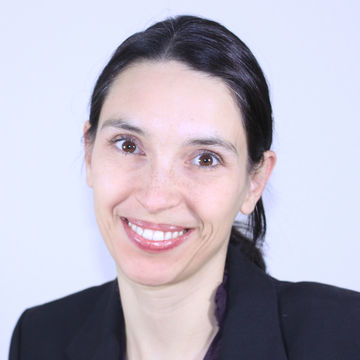
Prof. Dr. Margret Keuper
Chair of Machine LearningUniversity of Mannheim
Mannheim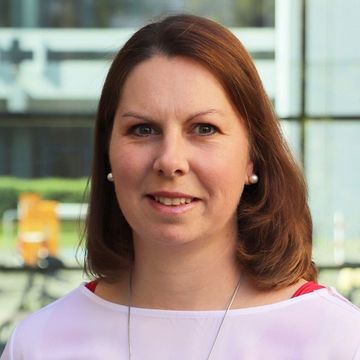 Credit: Emilie Orgler
Credit: Emilie OrglerBirgit Czanderle, M.A.
Student Success Coordinator, Study Coach Business Informatics, MMDS and MMSDS, Contact to Examination CommitteeUniversity of Mannheim
School of Business Informatics and Mathematics
B 6, 26
Gebäudeteil B – Room B 0.05
68159 MannheimConsultation hour(s):
by appointmentStudent representative: Alexander Haberling
You can contact the examination committee via pruefungsausschuss.wimuni-mannheim.de
Tasks of the central examination committee
We are responsible for the following topics:
- Advice on examination regulations
- Advice on module changes
- Advice in individual cases (such as extension of deadlines)
- Approval of reasons for withdrawal or delay
- Extension of examination deadlines
- Serious cases of cheating and breaches of regulations
- Determination of definitive failure with no option to re-sit
- Identification of missed deadlines
- Invalidity of examinations
- Appeal procedure
- Recognition of coursework and examinations
- Semester recognition certificates for BAföG, form 5 according to § 48 BAföG (also for LAG WPO)
Advisory service
The student advisory (run by the study coach and program manager) is a combined offer for the Mannheim Master in Data Science program.
You can consult us in questions regarding:
- the study program
- the module catalog
- the examination regulations
- cases of hardship
- questions about module changes
- course contents
- your degree plan (modules, tracks, thesis)
You can contact the advisory service via studienberatung.wimuni-mannheim.de.
 Credit: Emilie Orgler
Credit: Emilie OrglerBirgit Czanderle, M.A.
Student Success Coordinator, Study Coach Business Informatics, MMDS and MMSDS, Contact to Examination CommitteeUniversity of Mannheim
School of Business Informatics and Mathematics
B 6, 26
Gebäudeteil B – Room B 0.05
68159 MannheimConsultation hour(s):
by appointment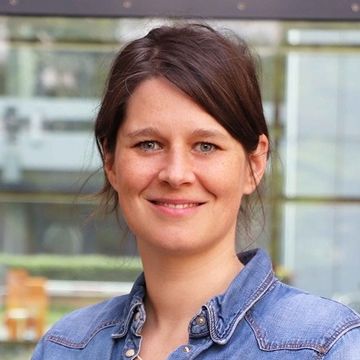 Credit: Emilie Orgler
Credit: Emilie OrglerLisa Wessa, M.A.
Program Manager B.Sc. Business Mathematics, B.Sc. Business Informatics, Mannheim Master in Data ScienceUniversity of Mannheim
School of Business Informatics and Mathematics
B 6, 26
Gebäudeteil B – Room B1.04
68159 MannheimConsultation hour(s):
You can reach me Mondays 11:00 a.m – 12:00 p.m. via phone or via E-Mail. Online-Appointments are possible.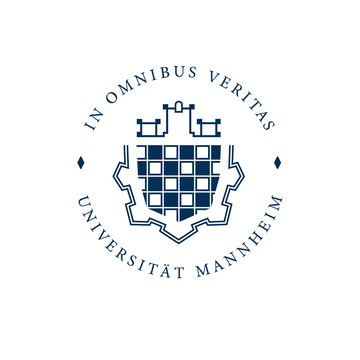
Contact the School of Business Informatics and Mathematics
University of Mannheim
School of Business Informatics and Mathematics
B6, 26
68159 MannheimConsultation hour(s):
by appointment via e-mailMaster's thesis
Finding a supervisor and a topic for your master’s thesis requires early planning and initiative on your part. It is primarily your responsibility as a student to contact a chair that fits your study profile. This means that you need to contact several chairs or professors on your own initiative in order to find someone who will agree to supervise your master's thesis. It is the norm that students contact the chairs personally, and something we expect from students at our school.
Who can supervise my master's thesis?
In general, all professors teaching courses in the MMDS program also supervise master’s theses. However, professors from other schools and departments may also do so, provided the topic falls within the scope of the MMDS program.
Industry Partner Network
MMDS students often write their master’s thesis in cooperation with a company from the MMDS Industry Partner Network.
